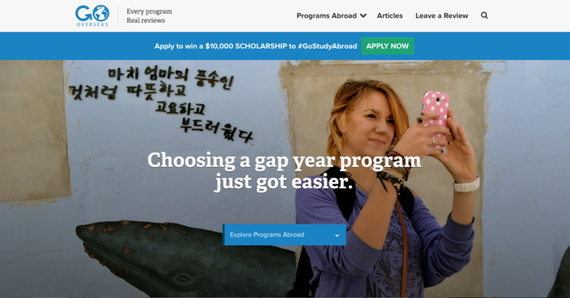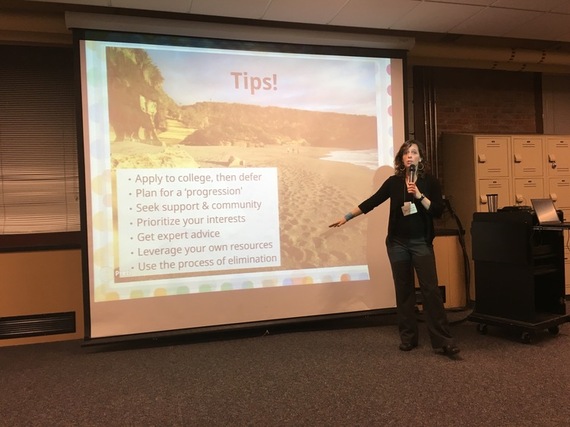Chances are once you start looking into gap year options, one emotion rises to the top of the list: overwhelm. While researching gap years can be really fun and exciting, it can also bring a whole new set of questions into the mix that don't exist on a "traditional" path. With so many programs and different options, how can you start to narrow down what you might want to do on a gap year?
The best place to start is by taking inventory of your interests--however vague or crazy they seem. Take out a piece of paper and write down everything that sounds like something you might want to do. Jane Sarouhan, the Center for Interim Programs' vice president, says that this is the time to dream big. She recommends putting any and everything down on that list, even if you think it's completely outrageous or totally impossible. You can always narrow it down later, but for now, Jane says this is your time to go as big as you can.
Here's an example of how pinpointing some interests might look in action. When Lucy Buckman was debating on how to spend her gap year, she knew language learning in South America was something she wanted to explore. "I had been studying Spanish for many years, so I knew one of the main things was that I wanted to get my Spanish more functional," Lucy explains. "I ended up living with a host family in Peru while I volunteered and studied Spanish." She had an inkling of which direction she might like to go in, and then searched for opportunities that aligned with her interests.
Questions to Ask Yourself
If you're having a hard time figuring out where to begin, try answering these questions as honestly you possible:
- What makes you happy?
- What are your favorite activities?
- In an ideal world, how would you spend your time?
- If you could design the perfect day, what would it look like?
- If you could plan the best year ever, what would it look like?
Hopefully, you'll start to see some common themes rising to the top of the list. Once you have a list of potential interests, it's time to hit the web and start reading. You can try Googling [gap year + your interest] and see what pops up. Enlisting the help of an educational or gap year consultant can also be a big time saver.
Calling In A Gap Year Pro
An educational consultant works with you to identify interests and ballpark career options, and to decide whether a gap year could be the right choice. Center for Interim Programs (where Jane works) is one option for gap year consultants, but you can also search for an educational consultant on the Independent Educational Consultants Association website at iecaonline.com. The IECA is a not-for-profit, international organization that aims to promote educational consulting for academic and professional guidance and development. Additionally, Certified Educational Planners has a list of certified educational planners on their website at aicep.org.
Even if you find a consultant through these channels, be aware that not all consultants are created equal. Because gap years are still a relatively fledgling concept in the U.S., many educational consultants may be unknowledgeable about the details of a gap year, or the appropriate programs to look into. If you come across someone who is unwilling or unable to help you in regard to gap years, keep looking.
Regardless of whether you're working solo or with a consultant, you'll look to start eliminating options in the next stage. So maybe you wrote down "Africa" as a potential travel location, but as you read more about it, you realize it's not really in line with what you want your experience to look like. That's actually a great learning--Jane says the process of elimination is just as important (if not more!) as identifying what you want to do.
Where to Start Researching Gap Year Options

GoOverseas.com is a great place to start looking for international programs.
Websites like GoOverseas.com can also be helpful during this research phase, as you can search an online directory for all kinds of programs abroad. Broken up into different categories--study, teach, intern, and volunteer--the site is neutral territory for all program providers.
"Our goal is to be a comprehensive site, and we put a lot of value into putting every opportunity up there whether it's good or bad," says GoOverseas' Mandi Schmitt. "The hope is that through alumni reviews, visitors can judge the validity of a program for themselves. Our policy is to never remove a review that's written by a valid participant."
It's also helpful to sit down with your family and establish a list that addresses concerns and questions. Sarah Persha, the American Gap Association's education director, says making a list helps you and your parents see where your concerns are different.
To begin the talk, discuss these questions together:
- Where do you want to sleep at night? Do you want to camp, or would you like to stay in a home?
- Should you be able to be easily in touch with each other? If not, when are the times that you should know you can be in touch?
- Do you want to travel or stay in one location?
- How many people would you prefer to have in your group?
- What will be the structure and supervision?
- What kind of environment do you want to be in? Urban, backwoods, suburban?
- Do you want to include a service (volunteer) component?
- Do you want to live with other students, or stay with a homestay family?
- Is there a certain subject of interest you wish to pursue in your gap year?
- What do you want to accomplish in the gap year?
Ranking the following in order of importance to you can also help to narrow down which experience might be best: fun, volunteer work, education, travel.
I mentioned gap year programs quite a bit in this post, but joining a program--or going international--is not the only way to take a gap year. Tomorrow we'll talk about domestic and international programs, and next week, we'll discuss whether a gap year program or an independent gap year is the best fit for you.
For now, give yourself permission to think about what you would do if time, money and experience was no issue. Remember: don't hold back and have fun.
With the help of Aloft Hotels, the American Gap Association and AT&T, I'm on a cross-country road trip to promote the gap year and educate more American families on the benefits of time away from formalized education. Follow along here on Huffington Post or on Gap to Great.


